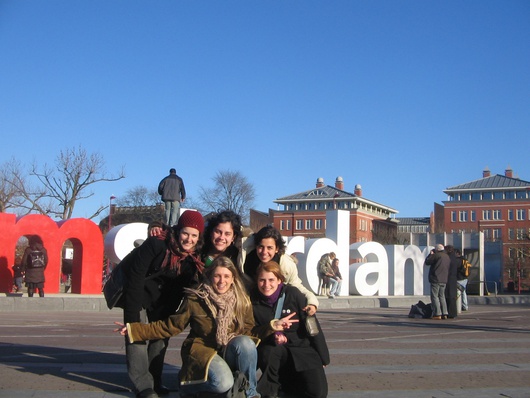
Hospitality club online: crashing Europe's couches
Published on
Translation by:
Lydia BigosThe internet social networking site that spans five continents connects homes all over the world for free, provides a cultural exchange and also the chance to save a few pennies
Imagine if you were able to travel the world without having to pay for your accommodation, imagine sharing different cultures with personalised guides, and all that totally for free… Well, you can stop imagining, as in the midst of a crisis, you can now turn your back on the cold and enjoy ‘free tourist packages’ of a kind. Since 2000, almost 300, 000 people have travelled cheaply thanks to the hospitality of the members of an internet social networking site that spans five continents.
Hospitalityclub.org
Marco Ugolini, an Italian based in Amsterdam, has formed part of this peculiar universal hotel since 2006. At least thirty people have stayed over at his house, and he is hard pushed to think of a negative aspect to this type of hospitality. He himself has had the opportunity to live 'for free’ in countries such as Estonia, Lithuania, Brazil, Portugal and Poland, as well as many more. He emphasises: ‘Yes, yes, to live. To get to know a city and its people at the same time allows you to get to know the place better than if you were to use a tourist guide.’
Anna and Kristine are two 21-year-old German girls who have just returned to Berlin from Río de Janeiro, where they were guests of Andre, a philosophy student in Sao Paulo. Both are delighted from their experience. ‘The suburbs of the city are what really helped us learn about life in Rio, the customs, the rich food and the friendliness of the Brazilians,’ says Kristine.
Registration and the start
The only requirements to register on the web are providing a first name and surname, as well as a genuine home address. While doubts may surface about the reliability and safety of the accommodation scheme, you can find any negative comments in the forums on the Hospitality Club website. Nevertheless the non-profit organisation recommends that both the host and the guest exchange information (even ID documentation) for a greater peace of mind. To be a member of the network does not imply that all applicants will be accepted; the admission rights depend on the availability, enthusiasm and impression of the host.
 One of the sections that are consulted the most on the website before becoming a host is that of the ‘experiences’. There, both locals and visitors will leave their thoughts and evaluations from each place that they have stayed. Any bad experiences mean that others may be reluctant to stay in the future, Simon Morrow from New York explains. He has not had any problems in his hospitality adventure. Simon has just moved to Milan to finish his studies in orchestral management, and appreciates being part of a club that doesn't only help with accommodation but also with getting to know contacts all over the world. ‘Thanks to my friends from 'Hospitality Club' I have found an apartment in this big city in less than a week. Somewhat miraculous,’ he confesses with a smile. Marco Ugolini says that the only negative aspect of this is that most of the members in ‘Hospitality Club’ live in developed countries. ‘I have tried in Asia, and still, I have not found any hosts.’
One of the sections that are consulted the most on the website before becoming a host is that of the ‘experiences’. There, both locals and visitors will leave their thoughts and evaluations from each place that they have stayed. Any bad experiences mean that others may be reluctant to stay in the future, Simon Morrow from New York explains. He has not had any problems in his hospitality adventure. Simon has just moved to Milan to finish his studies in orchestral management, and appreciates being part of a club that doesn't only help with accommodation but also with getting to know contacts all over the world. ‘Thanks to my friends from 'Hospitality Club' I have found an apartment in this big city in less than a week. Somewhat miraculous,’ he confesses with a smile. Marco Ugolini says that the only negative aspect of this is that most of the members in ‘Hospitality Club’ live in developed countries. ‘I have tried in Asia, and still, I have not found any hosts.’
Peace project
The website was created in Germany in 2000, starting life as a research project by Veit Kühne. The 22-year-old student was studying the existence of circuits of messages which pacifist aims from the second world war. Now, the internet makes things possible which were previously solved by simple barriers: the free movement of individuals. The founder of Hospitality Club says that the ultimate goal of the organisation is to 'promote peace through cultural exchange'. Veit, following by example, has travelled the world by hitchhiking and he’s not stopping until the 'Hospitality Club' reaches a million members. The German fears that this network may mutate and incorporate commercial itineraries. For now, the ‘Hospitality Club’ is a critic of the tourism industry, echoing the words of Sir Frances Bacon: Travel, in the younger sort, is a part of education; in the elder, a part of experience.
Translated from El club de la hospitalidad: conocer mundo sin pagar hospedaje



